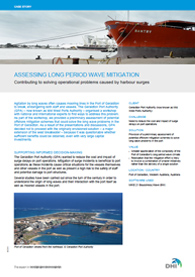 Agitation by long waves often causes mooring lines in the Port of Geraldton to break, endangering both staff and vessels. The Geraldton Port Authority (GPA) – now known as Mid West Ports Authority – wanted to reduce the cost and impact of surge delays on port operations.
Agitation by long waves often causes mooring lines in the Port of Geraldton to break, endangering both staff and vessels. The Geraldton Port Authority (GPA) – now known as Mid West Ports Authority – wanted to reduce the cost and impact of surge delays on port operations.
Several studies have been carried out since the turn of the century in order to understand the origin of long waves and their interaction with the port itself as well as moored vessels in the port. GPA needed a firm basis for making decisions related to ways to mitigate the problems in the future. As such, they invited experts from a number of experienced institutions, laboratories, and firms to participate in a workshop in order to arrive at an informed decision basis.
With the goal of creating a foundation for new initiatives to solve the serious problems caused by long waves in the Port of Geraldton, participants at the workshop analysed:
- long wave generation over reefs
- numerical modelling of long wave propagation into the port
- characteristics of long waves in the port
- resonance consideration and mitigation
- ship motions and mooring line tension
- improvements of mooring systems
- early alert systems for swell and long waves
Representatives from DHI were among those invited to contribute and participate in the workshop. Using MIKE 21 Boussinesq Wave (BW), we analysed long wave generation and propagation into the Port of Geraldton. We found that a breakwater structure at the fringe of the reef has the expected effect, but the costs of such measures would be prohibitive. A realignment of the access channel might have beneficial effects as well. That useful realignment, however, would lead to navigational difficulties for vessels transiting the channel.
As a result of the presentations and discussions, GPA decided not to proceed with the originally envisioned solution – a major extension of the west breakwater – because it was questionable whether sufficient benefits could be obtained, even with very large capital investments.